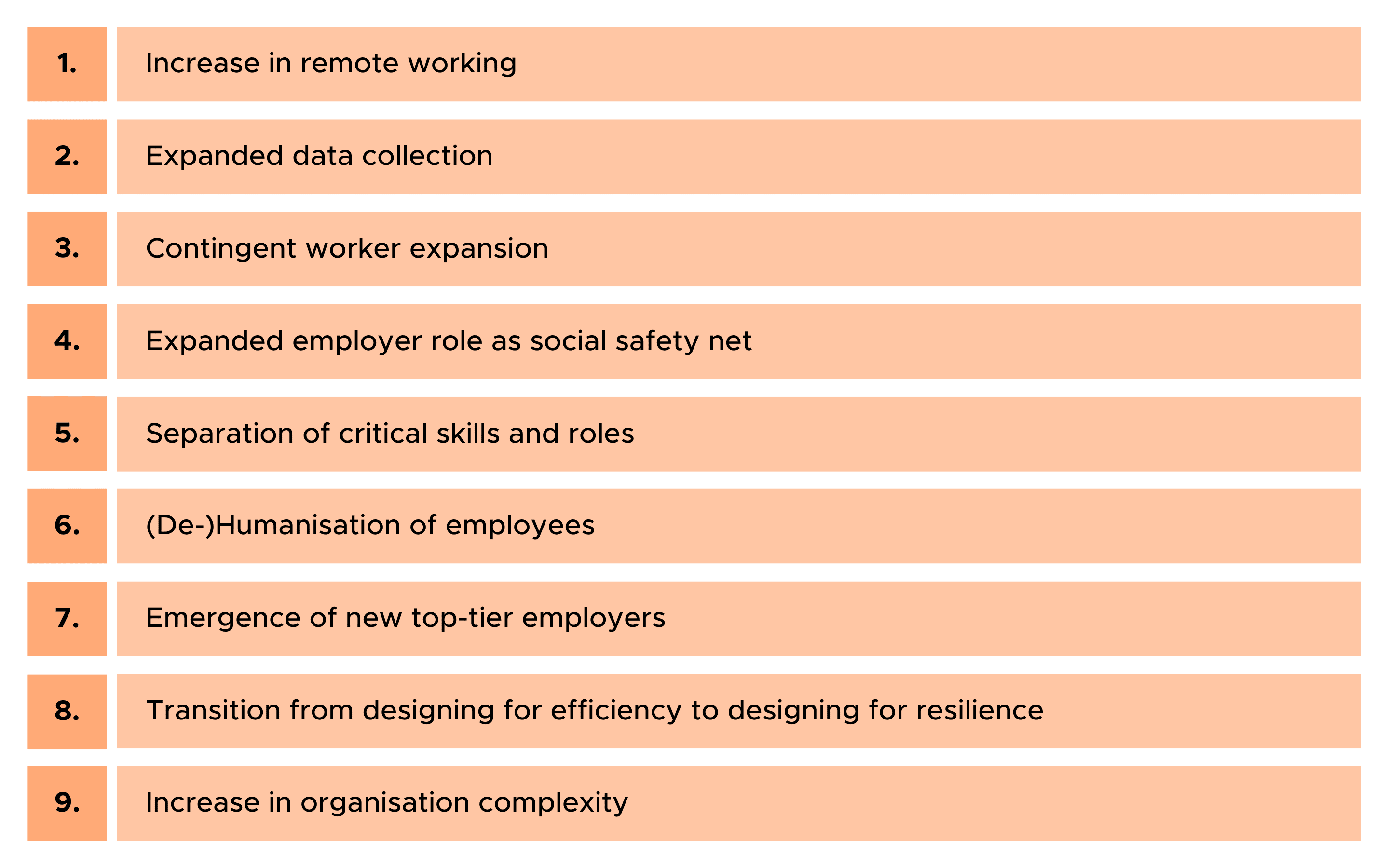10 Minutes of reading
Key skills and future of work trends for a post-covid world
The Covid-19 pandemic has been completely unprecedented, meaning that we’ve had no points of reference to help us make sense of what has unfolded.
Many sectors, such as retail and hospitality, struggled during the successive lockdowns in the UK and had to either make their employees redundant or put them on furlough. And as the pandemic has dragged on, the wider economy has taken a hit, with many companies being forced to shut down completely.
As we approach summer 2022, the situation is admittedly a bit more positive, mainly thanks to vaccines lowering the incidence of serious illness. But we are still learning to live with the virus and are recovering from the havoc it has wreaked on businesses and the economy.

Preparing for the unpredictable
One thing the pandemic has shown us is that we can’t predict the unpredictable. As the cost-of-living crisis takes hold and generates further uncertainty, it’s likely that there are more unknowns to come.
But, having weathered the storm of the pandemic so far, what can we take away from how businesses have learned to adapt? What skills really proved their worth during the pandemic? And, based on some projected future of work trends, how can help business future-proof themselves against other unforeseen crises?
Looking back: What key skills did organisations acquire during the pandemic?
The Covid-19 pandemic has completely turned our way of living, learning and working upside down. And the most successful companies have been the ones able to keep up with these changes.
Working from home, managing employees remotely, mastering technology and managing stress were tasks that none of us were required to do much of before. But the best performing companies, regardless of their prior expertise or experience in these areas, have been agile and responsive to change.
Let’s take a closer look at the skills that have become essential.
Remote management and working
As successive national lockdowns forced companies able to do so to move to 100% remote working, managers and employees had to learn to work together, albeit remotely.
Managers had to adapt very quickly and learn how to project manage their employees – none of whom were in the same place! The key to keeping teams going and delivering projects on time was, without a doubt, communication.
Here are some of the practices that successful companies adhered to:
- Regular communication: because during the early days of Covid, failing to update your employees regularly was just not an option! Many managers organised weekly meetings to go over what each of their employees should be focusing on. And even now, video calls are still a good way to check in with and support your team to ensure that you get the best out of a remote workforce.
- Using work collaboration tools that facilitated remote working. While video conference tools like Zoom and Teams did exist before the pandemic, they weren’t really being used. But when we were all forced to adapt to working from home, we couldn’t have coped without them. These kinds of tools gave us some much-needed human contact and made remote meetings much more seamless.
- Trusting employees: this was undoubtedly the trap that lots of managers and bosses initially fell into when it came to rolling out remote working. They discovered that there’s no point asking for progress updates every hour of the day. This just saps the motivation of employees and makes them feel that their managers don’t trust them.
Fortunately, remote working has since become its own discipline, and companies now have the benefit of learning from best practice implemented elsewhere. The CIPD, for example, has published its 10 top tips for managing remote teams – guidance that just didn’t exist in the early days of Covid.
A note on soft skills
Soft skills are personal attributes that are based on emotional and interpersonal intelligence. They differ from hard skills, which tend to refer more to the skills required for a specific profession.
It’s a fact that the Covid-19 pandemic has completely transformed the world of work. And, given the multitude of changes that business had to deal with, it’s soft skills that really proved to be crucial within teams. Employers now look out for employees who possess hard skills (i.e., technical skills) but, at the same time, they are much more conscious of soft skills.
Many of these tie into the skills mentioned above. For example, as a manager, making your employees feel trusted and valued is highly important, but this ability is difficult to quantify or measure (i.e., it is a soft skill, rather than a hard skill).
Looking ahead: New skills for a new reality
It’s clear that organisations and their employees have had to drastically change their ways of working and upskill at an unprecedented rate. Some employees might feel as if they’ve done more training during the pandemic than in their entire career! But it would be a mistake to become complacent and think “well, that’s enough change for now”.
The truth is that the world of work is only going to get more challenging for employees to navigate, be it because of the emergence of new technologies or other unforeseen obstacles, such as another pandemic.
The best way for companies to confront future challenges is by becoming training organisations – in other words, by embedding training into the working life of every employee, providing them with the chance to refresh their skills and remain competitive and relevant on the job market.
With that in mind, what skills do employees need to acquire to adapt to the world of work post-Covid? To answer this question, let’s take a look at some future of work trends.
Post-pandemic future of work trends
According to a survey conducted by Gartner of over 800 HR leaders, there are 9 future of work trends post-Covid-19 – and some of them might surprise you.

Source: 9 Future of Work Trends Post-Covid-19
While the increase in remote working (trend 1) and expanded role of employers as a safety net (trend 4) are clearly symptomatic of the changes brought about by the pandemic, some of the other trends for the future are a bit less evident.
For example, a knock-on effect of using technology to facilitate remote working has been that companies hold much more data on employee productivity, computer usage and communications than they ever have done before. In the future, it is expected that companies will begin to use this data – in line with responsible data use policies – to generate meaningful insights (trend 2). For instance, using data on absences and employee satisfaction levels, they can conduct analyses of employee wellbeing and use this feedback to improve their working environment.
Another interesting future of work trend relates to critical skills (trend 5). The idea is that companies should focus less on the skills required for each individual role and more on the skills needed to give the organisation a competitive edge. In practice, this means training employees in skills that will open up opportunities for their career development, rather than skills that will set them on a narrow career path. For example, within a tech company, this could take the form of teaching all employees how to do basic coding, even if their current role doesn’t require them to know how to do this.
Other future trends for organisations include ensuring that employees feel part of a culture of inclusiveness, whether working offsite or onsite (trend 6), designing flexible – rather than streamlined – workflows (trend 8) and investing in secondary markets in order to mitigate risk in times of disruption (trend 9).
Key skills for a post-Covid world
So, having looked at some future of work trends, what are the key skills that employees need to develop – and organisations need to cultivate – in a post-Covid world?
- Adaptability. There’s no doubt that this has become the most sought-after skill during the pandemic. An employee who can easily adapt to any situation will find it easier to adapt to new ways of doing things and working, compared with someone who is reluctant to change.
- Communication. Given that remote working is here to stay, employees need to know how to communicate among themselves or with managers in order to ensure that their projects move along swiftly. Moreover, being able to easily interact with others and address a meeting or room of people is a real asset which can enhance a company’s competitiveness.
- Being proactive. In exceptional circumstances, like during a pandemic, no one can claim to have all the answers for how to future-proof an organisation completely. But employees need to be able to take the initiative and be a driving force for change when required.
You can also read about the specific skills that trainers need to acquire by 2025.
See also adapting training courses in the wake of the pandemic.
The importance of continuous training
Even though the pandemic has left everyone a bit uncertain about what the future holds, one thing is for sure: organisations can’t afford to neglect training. In fact, it’s by training their employees – i.e., supporting them to develop and improve their skills – that companies will weather future storms.



